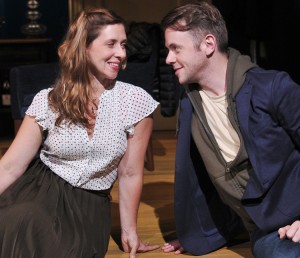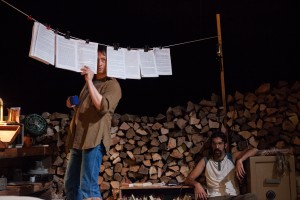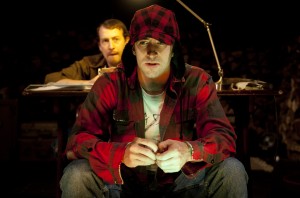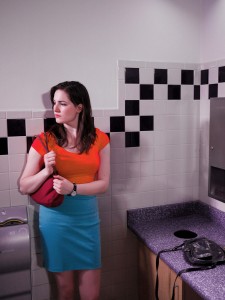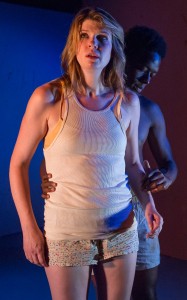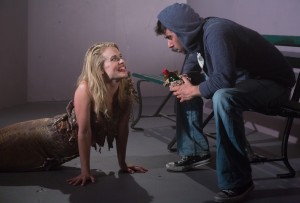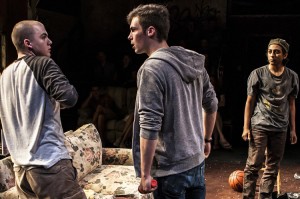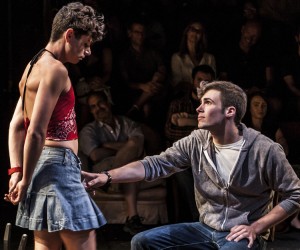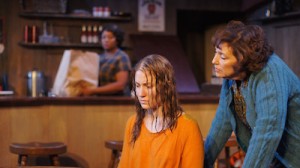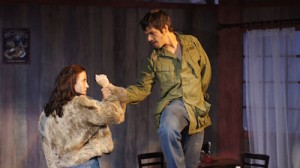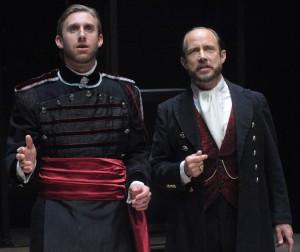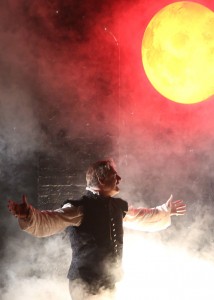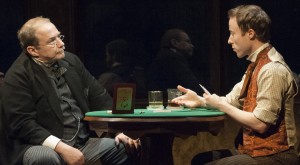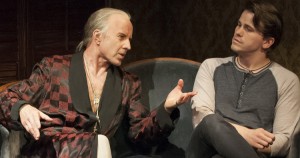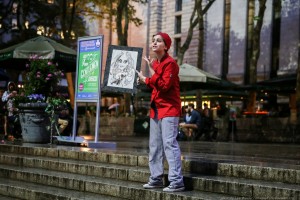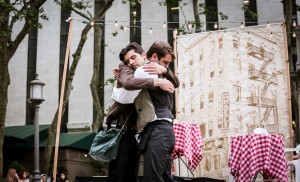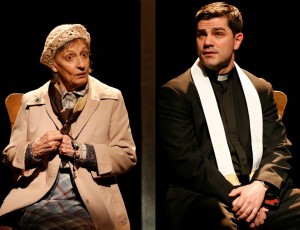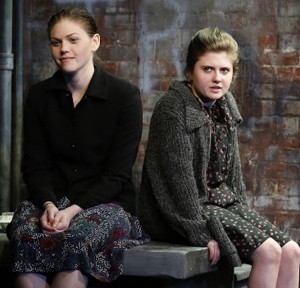Playwrights Realm has been a champion of new writing since its inaugural production, Substitution, back in 2008, and has often introduced important new voices in theater. Last year’s offering, the thrilling My Mañana Comes by Elizabeth Irwin, won two Drama Desk nominations. However, Anna Ziegler’s A Delicate Ship, whose title is taken from W.H. Auden’s poem Musée des Beaux Arts, doesn’t rise to the same heights.
The three-hander, a meditation on adulthood directed by Margot Bordelon, involves Sarah, a young woman in the midst of a happy relationship with her boyfriend Sam, and Nate, a young man whom she has known since childhood. Nate arrives drunk and unannounced on Sarah’s doorstep on a snowy Christmas Eve. What has instigated his sudden appearance is the discovery of a poem (Musée) he found in a college textbook from 1993.
As events unfold, characters break the fourth wall frequently to describe themselves or comment on cohorts. Early on, for instance, Sarah (Miriam Silverman) tells us about herself:
"I am the woman reading The New Yorker on the subway, mostly the cartoons and the movie reviews and occasionally an essay about the failures of doctors and hospitals and how we could, all of us, die very young…. In this memory, tonight, I am thirty-three."
At another point, Matt Dellapina’s easygoing Sam reveals: "I’m a Mets fan—always have been, die-hard—even during the years when they were worse than awful. I love sushi, though I didn’t have the nerve to try it til I was thirty-two years old."
It’s quickly apparent that Nate (Nick Westrate) is carrying a torch for Sarah, although it’s never quite clear why Silverman’s overly patient hostess suffers Nate’s intrusion into a romantic liaison on Christmas Eve. She and Nate used to smoke a joint together in their building while growing up, but it hardly makes his visit credible. Soon Nate is baiting Sam with snide comments that eventually turn into full-blown insults.
The set-up promises drama, but the direct address to the audience distances one from the emotions the characters feel. Ziegler has some interesting things to say about parents and children, time and happiness, but the primary mode of interaction is philosophical debate, even though Ziegler tries to establish the groundwork by having Sarah declare of Sam: “He’s a singer-slash-philosopher-slash-legal secretary.” It’s impossible to imagine any of them uttering something as mundane as “Please pass the mustard.” At one point, Bordelon even allows Nate to jump up and down on Sarah’s sofa with his shoes on. Ziegler seems to suggest that adults are uncertain children in full-size bodies, but it puts a great strain on credibility.
Even though the dialogue is lively, and Westrate brings passion to the volatile, overbearing Nate, there's a secondhand feeling to the proceedings. Once Nate exclaims, “Let’s play a game!” you might feel like cursing Edward Albee and Who’s Afraid of Virginia Woolf? and all the dramatic descendants that it has spawned.
Auden’s poem is not merely the source of the title, but a portion is read aloud. The poem itself describes another work of art, Pieter Bruegel the Elder’s Landscape with the Fall of Icarus, showing a leg of the overweening young man as he plunges into the sea in a small corner of the canvas. Meanwhile, life goes on around him obliviously, and, in Auden’s words, “The expensive delicate ship, that must have seen/Something amazing, a boy falling out of the sky,/Had somewhere to get to, and sailed calmly on.” Poem and painting make the point that, as the world experiences an ordinary day, someone nearby is having a life-changing event: death, ruin or horror.
Ziegler’s characters live that Christmas Eve with intensity, and in a sober, affecting coda, two of them meet years later in Prospect Park. (Here the blurry photograph of the New York City skyline that backs Reid Thompson’s simple set makes its most pointed contribution, suggesting the mists of memory.) Each has found happiness, known family loss, and had children. And parenthood, Ziegler implies, has forced them finally to grow up. It’s a beautiful finale to a sometimes awkward production.
A Delicate Ship plays through Sept. 12 at the Peter Jay Sharp Theater at Playwrights Horizons (416 W. 42nd St. between 9th and 10th Aves.). Evening performances are at 7:30 p.m. Tuesday through Saturday. Matinees are at 4 p.m. Friday and 2 p.m. Saturday. Tickets are $35 and can be purchased by calling Ticket Central at 212-279-4200 or visiting https://ticketcentral.com.






